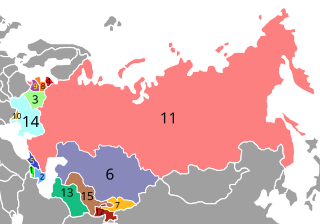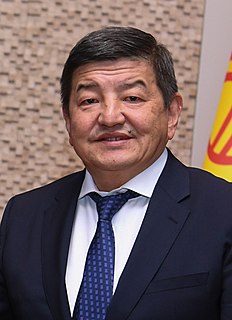Related Research Articles
Kyrgyzstan is a landlocked nation in Central Asia, west of the People's Republic of China. Less than a seventh the size of Mongolia, at 199,951 square kilometers, Kyrgyzstan is one of the smaller Central Asian states. The national territory extends about 900 km (560 mi) from east to west and 410 km (250 mi) from north to south.

The economy of Kyrgyzstan is heavily dependent on the agricultural sector. Cotton, tobacco, wool, and meat are the main agricultural products, although only tobacco and cotton are exported in any quantity. According to Healy Consultants, Kyrgyzstan's economy relies heavily on the strength of industrial exports, with plentiful reserves of gold, mercury and uranium. The economy also relies heavily on remittances from foreign workers. Following independence, Kyrgyzstan was progressive in carrying out market reforms, such as an improved regulatory system and land reform. In 1998, Kyrgyzstan was the first Commonwealth of Independent States (CIS) country to be accepted into the World Trade Organization. Much of the government's stock in enterprises has been sold. Kyrgyzstan's economic performance has been hindered by widespread corruption, low foreign investment and general regional instability. Despite those issues, Kyrgyzstan is ranked 70th on the ease of doing business index.

Kyrgyzstan, historically known as Kirghizia, officially the Kyrgyz Republic, is a mountainous landlocked country in Central Asia. Kyrgyzstan is bordered by Kazakhstan to the north, Uzbekistan to the west, Tajikistan to the south, and China to the east. Its capital and largest city is Bishkek. Ethnic Kyrgyz make up the majority of the country's six million people, followed by significant minorities of Uzbeks and Russians. The Kyrgyz language is closely related to other Turkic languages.

The Economic Cooperation Organization or ECO is an Asian political and economic intergovernmental organization which was founded in 1985 in Tehran by the leaders of Iran, Pakistan, and Turkey. It provides a platform to discuss ways to improve development and promote trade and investment opportunities. The ECO is an ad hoc organisation under the United Nations Charter. The objective is to establish a single market for goods and services, much like the European Union. Following the dissolution of the Soviet Union, the ECO expanded to include Afghanistan, Azerbaijan, Kazakhstan, Kyrgyzstan, Tajikistan, Turkmenistan and Uzbekistan in 1992.

The post-Soviet states, also known as the former Soviet Union (FSU), the former Soviet Republics and in Russia as the near abroad, are the 15 sovereign states that were union republics of the Soviet Union; that emerged and re-emerged from the Soviet Union following its dissolution in 1991.
Alikbek Jeshenkulov is the former Foreign Minister of Kyrgyzstan (2005–2007) and now the leader of the oppositional party "Za spravedlivost".
The Deutsche Gesellschaft für Internationale Zusammenarbeit (GIZ) GmbH, often shortened to simply GIZ, is the main German development agency headquartered in Bonn and Eschborn that provides services in the field of international development cooperation and international education work. It is the organization's self-declared goal to deliver effective solutions that offer people better prospects and sustainably improve their living conditions.
The major environmental issues in Kyrgyzstan, are summarized in the 2007 Concept of Ecological Security of Kyrgyz Republic and discussed in other environmental and environmental policy documents such as National Environmental Action Plan (1995), Country Development Strategy for 2009–2011, Strategy on Biological Diversity (2002), 2nd Environmental Performance Review of Kyrgyzstan (2008), etc.

Agriculture in Kyrgyzstan is a significant sector of the economy. According to the CIA World Factbook, it comprises 18% of the total GDP and occupies 48% of the total labor force. Only 6.8% of the total land area is used for crop cultivation, but 44% of the land is used as pastures for livestock. Because of the many mountains of Kyrgyzstan, animal husbandry remains a significant part of the agricultural economy.

The Cabinet of Ministers is an executive body chaired by the Chairman of the Cabinet of Ministers of Kyrgyzstan. The status and provisions of the government are determined by Section V of the Constitution of Kyrgyzstan. The cabinet consists of the deputy chairmen, ministers and the chairmen of state committees.

The National Bank of the Kyrgyz Republic is the central bank of Kyrgyzstan and is primarily responsible for the strategic monetary policy planning of the country as well as the issuance of the national currency, the Som.
Soil governance refers to the policies, strategies, and the processes of decision-making employed by nation states and local governments regarding the use of soil. Globally, governance of the soil has been limited to an agricultural perspective due to increased food insecurity from the most populated regions on earth. The Global Soil Partnership, GSP, was initiated by the Food and Agriculture Organization (FAO) and its members with the hope to improve governance of the limited soil resources of the planet in order to guarantee healthy and productive soils for a food-secure world, as well as support other essential ecosystem services.

The Border Guard Service of the State Committee for National Security of the Kyrgyz Republic also commonly known as the Kyrgyz Frontier Force is the border guard of the Kyrgyz Republic. It is currently a Public Service department of the government of the republic and is not part of any ministries.
Science and technology in Kyrgyzstan examines government efforts to develop a national innovation system and the impact of these policies.
Science and technology in Tajikistan examines government efforts to develop a national innovation system and the impact of these policies.
The Ministry of Culture, Information, Sports and Youth Policy, previously known as the Ministry of Culture, Information and Tourism of the Kyrgyz Republic, is the ministry in charge of preservation and promotion of Kyrgyzstani culture in the republic and abroad. The ministry has its roots from the Soviet Union's Ministry of Culture, although the current ministry did not succeed directly from the Soviet ministry. Moreover there were no ministries or state committees for tourism in the Soviet Union, because tourists to and from non-communist countries were highly restricted and few in numbers.
Law enforcement in the Kyrgyz Republic is primarily the responsibility of the Ministry of Internal Affairs. The ministry commands the police force, also known locally as militsiya, directly and thus policemen carry the insignia of the ministry (ИИМ). This structure of law enforcement is similar to its predecessors and many other post-Soviet states. The ministry is subdivided into numerous departments that tackle the different aspects of law enforcement in the Kyrgyz Republic and is also supported simultaneously by other governmental agencies. The police is contactable via the emergency hotline number 102.
The State Penitentiary Service of the Kyrgyz Republic is a Public Service department of the government of the Kyrgyz Republic that is in charge of the penitentiary institutions and systems of the republic. It is currently not under the jurisdiction of any ministries, although it works closely with the Ministry of Internal Affairs and Ministry of Justice to safeguard the country. The abbreviation GSIN, which is derived from its Russian name, is also used in conjunction, and is not to be confused with Russia's Federal Penitentiary Service (FSIN).
Climate change in Kyrgyzstan is already having impacts. Among the countries in Eastern Europe and Central Asia, Kyrgyzstan is the third most vulnerable to the effects of climate change, such as changes in weather patterns that could lead to prolonged periods of precipitation and drought. Their average temperature has increased from 5.8 °C to 6 °C so far within the last 20 years. In 2013 the World Bank estimated a likely increase of 2°C in average mean temperature by 2060 and of 4–5°C by 2100, noting that the country's glaciers were significantly reduced and projected to decline further. However the very slight increase in temperature is expected to positively affect climate-sensitive sectors such as agriculture, energy, and forestry as more land is within the optimum temperature band.

Japarov Üsönbek uulu Aqılbek is a Kyrgyz politician serving as Chairman of the Cabinet of Ministers of Kyrgyzstan since 12 October 2021. He replaced Ulukbek Maripov, who had been appointed to the new role by President Sadyr Japarov on 5 May 2021. Aqılbek is also concurrently the Head of the Presidential Administration under President Japarov.
References
- ↑ "Сельское хозяйство Кыргызстана: Миссия выполнима". 2017-09-27. Retrieved 2018-09-07.
- ↑ "IFAD in Kyrgyzstan". 2018. Retrieved 2018-09-07.
